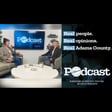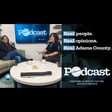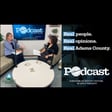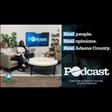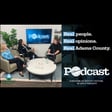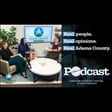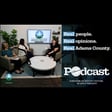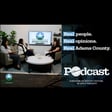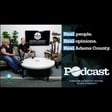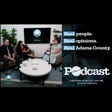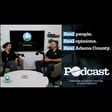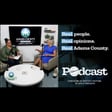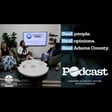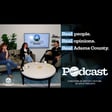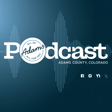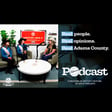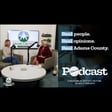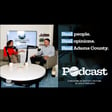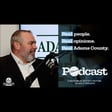Become a Creator today!Start creating today - Share your story with the world!
Start for free
00:00:00
00:00:01

All in Adams--Allison Blakeney
Welcome to All In Adams, the Adams County podcast where we connect you with the people, programs, and conversations shaping our community.
In this episode, Allison Blakeney of the Poverty Reduction Team joins the podcast. Allison shares more about their role with Adams County and how they've used past experiences to help support Adams County residents.
Transcript
Introduction to Adams County Podcast
00:00:04
Speaker
Welcome to All In Adams, the official podcast of Adams County Government, where we're all in for our residents, our employees, and our community. So whether you live here, work here, or you just want to know more about what makes Adams County a great place to be, thanks for tuning in.
00:00:21
Speaker
We're all in, Adams.
Meet Allison Blakeney, Homelessness Resolution Supervisor
00:00:23
Speaker
Welcome back to another episode of the All in Adams, Adams County podcast. My name is Carson Forsman. I'm with Adams County and I'm joined with Allison.
00:00:32
Speaker
Allison, thanks so much for being here for this episode. I'm super excited to get to know you a little bit more. Just introduce yourself. well What do you do for Adams County? And yeah, who are you? Yeah, totally.
Role and Impact in Poverty Reduction Unit
00:00:42
Speaker
um My name is Allison Blakeney. I'm the Homelessness Resolution Supervisor for Adams County. So I work in the Poverty Reduction Unit and we do homelessness outreach work. Wow, that's amazing work, of course, and we appreciate all that you do for the county.
00:00:58
Speaker
um How long have you been with the county, and how's that going so far? I have been here a little over a year, so a year and three months, and it's going great, actually. I can't believe that it's been over a year. What do you what do you enjoy most about the work that you do?
00:01:15
Speaker
Oh, wow. There's a lot that I enjoy. i mean, I love working with people who are out on the streets experiencing homelessness. So, I mean, i I just love it so much. So that's probably the main thing that I enjoy. um i really like my boss, Lindsay Earl. She is. Big shout out to Lindsay. Big shout out to Lindsay. We work with her too on projects. She's awesome.
00:01:35
Speaker
She is. She's like really um just like very action oriented. And it's really nice to be a supervisee of somebody who works like that and to feel like we're actually making an impact to the residents that we serve. So that's been wonderful.
00:01:50
Speaker
And then um just working with my supervisees, the navigators who are really, really amazing. And how many ah navigators are underneath you or would that work with you on your team? I guess how big is your team?
00:02:01
Speaker
Yeah. So the team, there's the poverty reduction unit, which is the whole team that does three sort of different types of work. But within that, there's the homeless team. And so within that, there's the street outreach folks.
00:02:15
Speaker
So that is myself and then the three navigators, Jessica Kalkman, Odia Naya, and Jorge Scholz. Awesome. And I want to unpack a little bit about what you do and how maybe your past experiences have shaped the way that you support our residents who are experiencing different
Personal Journey and Its Influence on Work
00:02:33
Speaker
things. um Talk to me a little bit about your story. I want to start there and kind of what got you to this point. Maybe take me back.
00:02:42
Speaker
Let's learn a little bit more about you. yeah If you wouldn't mind sharing. What have you kind of gone through and your past? Yeah, for sure. So I am sober from alcohol or I'm sober from everything. But the thing that. Yeah, thank you. The thing I got sober from was alcohol.
00:02:58
Speaker
um It'll be 10 years in November this year. Wow. That's an amazing milestone. Yeah. Yeah. So hopefully i make it. I'm sure that it'll be OK. Um, but so i I, mean, I started drinking pretty alcoholically early on 14, 15 years old.
00:03:18
Speaker
Um, and it kind of escalated and I ended up getting sober at 25. After like a lot of different situations, there's a lot of, you know, stories that I could go into, but we don't need to do that. So um I got sober 25 and that was really when I started to realize that I had any mental health things happening outside of.
00:03:43
Speaker
you know, substance use. I didn't know that I had anxiety. I didn't know any of that because I was just kind of living in a chaos for a long time, you know? So when I got sober, I started realizing that I have anxiety. And honestly, now that I look back at it retroactively, I did get diagnosed anxiety way before I got sober and, and also OCD.
00:04:04
Speaker
And so those are like the primary mental health, um, diagnosis that I Work with every day along with subs. How do you use those experiences? Maybe give me some experiences that that you've gone through with folks who are dealing with similar things.
00:04:24
Speaker
um How do you use that? i don't want to say to your advantage, right? But like, but how do you use that? To relate? Yeah. people Yeah, it's been a learning how to do that has actually been a journey because I think that some of the ah so what I will say is that for for me, my experience with lived experience and ah watching other people is that we tend to sort of fall on one side of the extreme when it comes to boundaries with the people that we serve. We can be really loose and overly compassionate or really um tight and rigid with it.
00:04:57
Speaker
And I tend to be overly compassionate. So what originally when I started working at a shelter in Denver, I would what i what I would consider now is like overshare. So, for example, if there was a somebody at the shelter who was struggling with substance use, I would overshare like, hey, I got sober. Here was my experience. And it wasn't actually useful to share to that degree. Interesting.
00:05:19
Speaker
Yeah, because I think that. um Everybody's experience is different. that how you would say it? or Yeah. Everybody's experience is different. Different substances are different. You know, there's different mental health associated with it. Comorbidities. Like there's just a lot of complications, but at the end of the day, is it actually helping the person that we're serving or not?
00:05:41
Speaker
Right. And that's the biggest question that I asked myself, am I connecting to um to actually support them in where they are trying to go, or am I not? And so sometimes disclosing will be to that end, and then sometimes it won't be to the end.
00:05:59
Speaker
And with this person in particular, it wasn't to that end. um She ended up just because of what she was going through, her mental health, her substance use, it was more that she kind of used it to justify her...
00:06:12
Speaker
her behavior in a way. got yeah So, yeah. So, um, so since then I've kind of learned the way that I will use my lived experience to to, work with residents is to try to understand where they might be coming from, understand where their behaviors might be coming from. So from a trauma informed perspective, right. Knowing that most people are like whatever behavior we see on the surface, there's a lot more happening underneath.
00:06:39
Speaker
Right. um But then still holding those boundaries. So while I can understand where this is coming from, I also know that there's a certain expectation for behavior, but I'm going to express those in advance.
00:06:52
Speaker
So somebody is aware of what the expectations are. I'm going to offer some compassion some compassion, some benefit of the doubt, because I do know what it's like to some degree.
00:07:03
Speaker
Right. um And then there's going to be a point where I have to hold that accountability and those boundaries. And for me, that's where my learning has been, because I've been overly passionate and trying to overly connect with.
Support Services and Challenges in Housing
00:07:15
Speaker
Can you share in Adams County, right, what you're seeing and who you're interacting with ah for our residents, maybe listening to this and how you're helping them um in your day-to-day duties?
00:07:28
Speaker
You mean like with the outreach team specifically? the outreach team, yes. Yeah, absolutely. So we do a variety of different, um we we provide a variety of different kinds of support.
00:07:39
Speaker
So it will be support from the emergency so emergency services, meaning like life-saving services. So those would be like tents, sleeping bags, warm weather items, um food, water, you know, things that that are really imperative that people have to support.
00:07:55
Speaker
and withstand the weather, right? Temperature like that, um as well as our severe weather activation program that almost home runs. So those are some things that we provide, but then we also do provide navigation towards housing, towards vital documents. So a lot of times folks won't have their IDs, their birth certificates, their social security, they'll get stolen.
00:08:16
Speaker
and then it's really difficult to get one if you don't have the others. So there's a lot of systems navigation in that regard and then benefits as well. So we will support residents that um we do a lot of encampment projects. So that's a collaboration with the county as well from departments.
00:08:34
Speaker
Um, And just really logging the encampments, working with the residents at the encampments to try to get them connected to services. Again, most people want to be in housing. It's very rare that people don't. That's what I was going to ask you. Yeah. So what do they say or what's the, I guess everybody's different, right? What they're going through and why they maybe can't get into housing. Mm-hmm.
00:08:56
Speaker
In general, what are they what are they telling you? ah They're appreciative of what you are are doing, right? And what you're providing to them to get that help, I would assume. Yeah, yeah, yeah. Most people want to be in housing. there is it's It's tricky because there's just a lot of difficulty navigating systems.
00:09:14
Speaker
It can be really difficult to get. Like I said, you need to get an ID in order to get a ah social security card. You know, how are you going to get your birth certificate? What if you've never had an ID in the state of Colorado? That's going to be a much more difficult thing to do.
00:09:29
Speaker
And so there's all of these systems to get a job. You need an address. But if you're homeless, you might not have an address. Right. So what address are you going to use? So there's all these little logistical things that I think people don't think about.
00:09:42
Speaker
Yeah. That's great to point out because people don't. No. Yeah. Yeah. So, so it's more that there are just so many systems to navigate, to get to the first step that it can be difficult. And then there's also the reality that, um, folks might have a community, you know? And so to just immediately move away from that community can be really difficult as well.
00:10:10
Speaker
Yeah, that's great points that, you know, lot of people probably don't think about and what you all interact with on a day to day basis.
Encampment Resolution and Success Stories
00:10:18
Speaker
What's your current project or what are you all working on right now? Just curious, like this month in June, right? What are you all working on?
00:10:26
Speaker
Is it different each day for you? Yeah. So right now we're working on an encampment resolution. Which those can be tricky, right? Or maybe I'm assuming, right? But and an encampment resolution, maybe tell the audience what that is. What does that mean?
00:10:41
Speaker
Yeah. So this specific project, this is something that's happening nationally. um Different cities are doing this with a lot of success rates. So what it does is it takes the principles of emergency management and applies it to homelessness.
00:10:56
Speaker
So rather than providing a little amount of services over a long period of time, which is historically how it's happened, it's It is taking a lot of resources, services front at an encampment, getting folks into housing quickly as possible, and then providing financial and case management support on the back end.
00:11:16
Speaker
So through rapid rehousing, which is really going to be six months to a year of financial support and case management, behavioral health support. And then that will start to taper off as folks get that find their own stability.
00:11:30
Speaker
So we are working on our second encampment right now in Adams County doing that. Your second one. So how did the first one go? Can you share that? ah that went? It's an entirely different way of working.
00:11:43
Speaker
So it's a little bit like, Like you're you're heading up a hill on a roller coaster and you're going up and you're going up and you know that it's going to drop soon and then it drops and it is just go, go, go, go. So it is it is such a different way of working. And then I think too, as navigators and outreach workers, where we're used to getting sort of stops in systems where we have to wait then for weeks for something to happen, right? Or right now it's really hard to get an an appointment for an ID, right?
00:12:12
Speaker
within like two months, like they're booking out through July and August at the DMV, you know? So, um, so it's really about trying to, instead of just accepting that barrier, figuring out, okay, how do we build a workaround? How do we, what else can we do? So a real example, let's say we have a resident who doesn't have an ID and it, and we can't get a DMV appointment in time for this encampment to close, which is going to close in four to six weeks.
00:12:39
Speaker
So from the time we get out there, the, we have four to six weeks to get everybody document ready and into housing. Um, and so let's say we know for a fact that this person's not going to get an ID by that time.
00:12:53
Speaker
We're going to go to the apartment and say, hey will you take a DMV appointment with another form of identification through this homelessness management information system that we use with a birth certificate?
00:13:06
Speaker
Will you take these documents knowing that we are going to keep working with this person and we will get you the ID when you have it? Right. So it's really about not accepting the barriers and finding the workarounds to get people into housing, knowing that we will keep working with them and the landlords.
00:13:23
Speaker
Right. To um to to finish those those steps that we're taking. A lot of problem solving. A lot of problem solving. Yeah. hmm. What do you love about your job? And then maybe share an experience that you've had with some folks on those maybe success stories.
00:13:39
Speaker
Oh my God, i have the best one That's probably what you love, right? That keeps you coming back is helping people, right? her Yeah. um I have one and it also highlights our relationship with the Rangers because that has been like a very extraordinary and you relationship.
00:13:58
Speaker
We work in partnership with them and they they are out there, you know, on the trails and they know a lot of these residents that we're working with as well. And so one of them, he had been Homeless for 10 years on the streets.
00:14:14
Speaker
um One of the rangers found him mid heart attack and saved his life. And then he had to, they posted him. He had to move like a while later. They posted him. He had to move. o We ended up, the ranger reached out to us and said, can you outreach to this person? We ended up going to outreach to him.
00:14:33
Speaker
um And we were able to get him into one of our programs, but we needed to ask them to, you know, can you wait a few or to clean up his site so we can get him in. We're trying to get him in by this day.
00:14:47
Speaker
so we did that. And um gosh, that was last summer. Fast forward, there's ah there's a permanent supportive housing project called Renewal Village here that is a collaboration with the Colorado Coalition for housing.
00:15:00
Speaker
yeah does It's down in Denver and then some other, this the city, I think, and um Adams County. And anyway, so it's a permanent supportive housing site called Renewal Village. And we were able to get him a referral and he just moved into housing there.
00:15:16
Speaker
Amazing. Yeah. And so he was chronically homeless 10 years was having heart attacks um in this process of getting him into housing. He's had a heart attack already. He's had to go to the hospital.
00:15:28
Speaker
Like it's really been huge. And now he's in there and he's so happy to be in there. And all he cares about is watching his shows. And that is it. He's like, i don't want to talk to anybody, but just let me watch this shows. And that's it.
00:15:41
Speaker
Wow. those Those stories, yeah, like I said, probably keep you, that's that's what keeps you going and helping people. And you and your team do amazing work. I know we're running out a little bit of time here, but anything else you want to share maybe that I missed?
00:15:55
Speaker
um Yeah. um Anything else that I want to share about the work that we do? You know, I think that...
Passion and Impact of the Work
00:16:10
Speaker
What I will say is I feel i really got into this work because, well, firstly, I love working at shelters. That's what got me into this work. I love and I also love working with people who are experiencing homelessness.
00:16:21
Speaker
um But more than that, it's because I love when people feel like they belong. When they feel like they have some dignity and they can feel that reflected back to them. And then for like, it just feels to me like a really big honor to be able to.
00:16:39
Speaker
um hear people's stories, anybody really, right? Housed or unhoused. Like i just, I just love working with individuals and their individual story. But I will say that pairing that with this team specifically, this homelessness team um that Lindsay runs to be able to see like tangible examples and really be able to address homelessness in the way that we are has been so rewarding because this work can be really exhausting and it can feel like a cycle, like an endless cycle that, you know, you're never actually seeing the, any like true results.
00:17:16
Speaker
Especially with all the barriers, right? the problem solving that you already mentioned. And at the root of the problem, right? Where it's like, wow, we're still folks, more people are experiencing homelessness, right? Like it so feels like there's still not enough housing.
00:17:29
Speaker
There's still people on the streets. But I really feel like in Adams County, we have been really using both evidence and also people's lived experience to guide our programs in a way that I feel like we are actually making an impact.
00:17:44
Speaker
And so that is also very exciting to be a part of. Well, Allison, thank you so much for taking some time to chat with us. I could chat with you for like hours, but we only have so much time. Maybe we'll have you on the podcast again, but seriously, thank you so much. And I know our county, our commissioners and our residents appreciate the work that you and your team do. So keep up the great work.
00:18:06
Speaker
Thank you so much. Thank you. Thanks for having me. You bet. That's a wrap for this episode of All in Adams. Thank you for joining us as we explore the people, programs, and the policies that make Adams County a great place to live, work, and thrive.
00:18:21
Speaker
If you enjoyed the show, be sure to subscribe and share with your friends, neighbors, and colleagues. Have a topic you'd like us to cover? Let us know. We're all in for bringing you the stories that matter most.
00:18:32
Speaker
Until next time, take care of each other and stay connected with us on Facebook, Instagram, Nextdoor, and X. We're all in, Adams, and we're all in for you.
